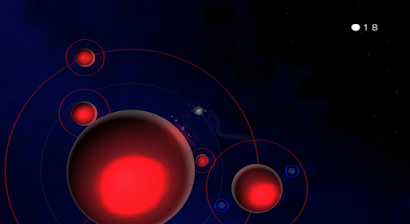Games don't need stories. Stories can just emerge from gameplay. You can personify inanimate objects, moan when something bad happens to them, cheer at something good. That's pretty much all the story you'll get from Art Style: Orbient, a gravity 'simulator' puzzle game that has you control a star drifting through the galactic neighbourhood.
And for the old folks out there, it uses just two buttons. Wow. Stripping gaming back to its roots here, eh? Let's find out how many laws of physics we need to relearn.
Fun Times
Congratulations, you've just learned how to play Orbient.
I'm emulating the WiiWare release of this game, originally for the Japanese Game Boy Advance market, and I don't have to faff around with the control settings at all. The A-button generates gravity, the B-button generates antigravity. The A-button moves you closer, the B-button pushes you further away.
Gobble up small stuff, Katamari-style, to grow big enough to trap the goal star into an orbit around you. That's it.
It's a chill little game, Orbient. Minimalist, relaxed. It introduces a little solar system to puzzle your way through and lets you get on with it. Drift towards a target, consume it, grow bigger, drift towards the next.
You'll be scored on how great you are at wandering through the galaxy, but I don't really care about the score in this kind of game. It's not what motivates me to keep playing, that's for sure.
I was enjoying Orbient for its relaxed nature, even when it came to the laws of physics. The antigravity button is used to push away from objects, slowing your progress and avoiding a collision with something bigger than you. But even colliding with a bigger star isn't terribly detrimental to your game, as you lose a life, ghost out for a few seconds, and carry on from where you were.
As setbacks go, bumping into the wrong thing results in a little 'whoops' and that's the end of it.
As levels go on, the puzzles you need to navigate get trickier, and more hazards are introduced. Cluttered orbits, asteroids and so on. This level, completed by an expert, would look like some kind of dance, as you float between orbits hoovering up smaller stars in quick succession.
To me, it was full of collisions and lots of playing the waiting game, spotting where best to approach the target before hoping I timed the pull of gravity right to get close.
Frustrations
Often, it went disastrously wrong, but remember, collisions are like boo-boos, and I eventually used them just to try and put myself into better positions. A rubbish strategy that I don't really advise. The stages wrap around themselves, so if you end up drifting too far to the right, say, drift a little more and you'll approach the target from the left.
Maybe that's better for you than struggling to line up an orbit. Maybe it's easier to get swept up and just circle the system for a little while to get your bearings. Just slowing it down can result in, well, results.
After 8 or so stages, though, I was starting to tire of Orbient. Surely I'd seen enough to know what it was about by now? It introduced asteroids, they were different, yeah, but I'm still in the first galaxy of however many there were, and I don't know how many stages each galaxy offers, and Orbient is really, really good at just loading straight into the next stage when you've finished looking at the scoreboard.
But I'm a bit bored of it already. It was nice to waddle around the galaxy desperately trying to grab onto anything in sight, only to be propelled into the beyond instead. Delicately weaving through obstacles to snag a little star feels great, but the chances of you getting everything timed to perfection are slim.
Final Word
I drew my time with Orbient to a close because I got the point. You can make a lovely little game with just two buttons and consistent video-gamey laws of physics. It's fun. It's satisfying. It's relaxed, it does what it says on the tin.
And yet it's going to have a shelf life, and that's going to vary for each player. How strong is the pull of gravity towards Orbient? Depends how massive you are? That doesn't sound right.
As a little distraction or a welcome break from something, Orbient isn't bad. I don't see myself reaching for it again any time soon, but wouldn't rule it out either. I guess if I'm ever in the mood for a physics simulator and don't want to build bridges, this is a good alternative, even if it's unrealistic.
Maybe I'll try it on the GBA sometime, and see how that changes my view.
Fun Facts
Black holes make an appearance later on and will reset the level if you fall into them. That enough of a challenge for you?
Art Style: Orbient, developed by Skip Ltd., first released in 2006.
Version played: WiiWare, 20080, via emulation.




















